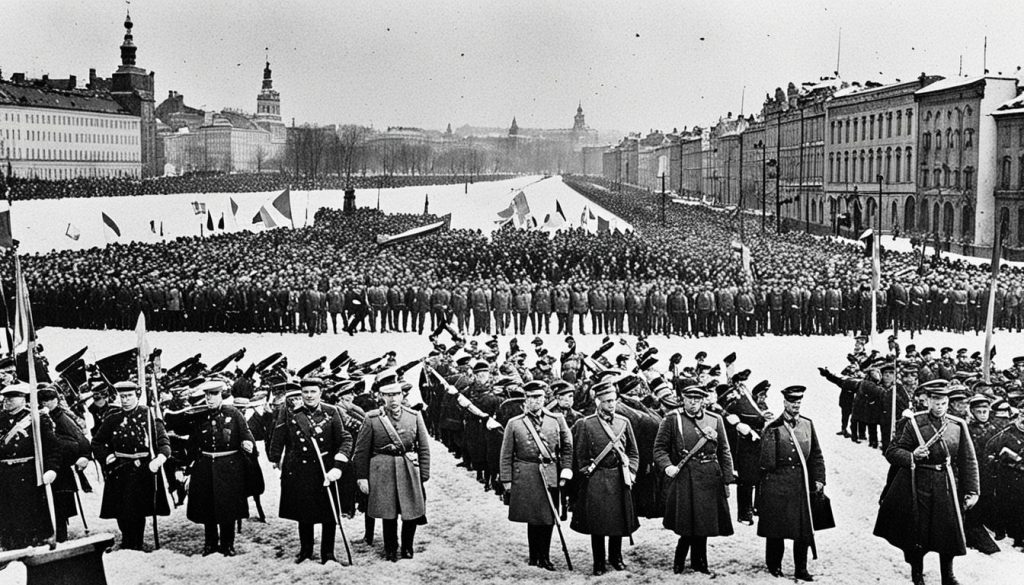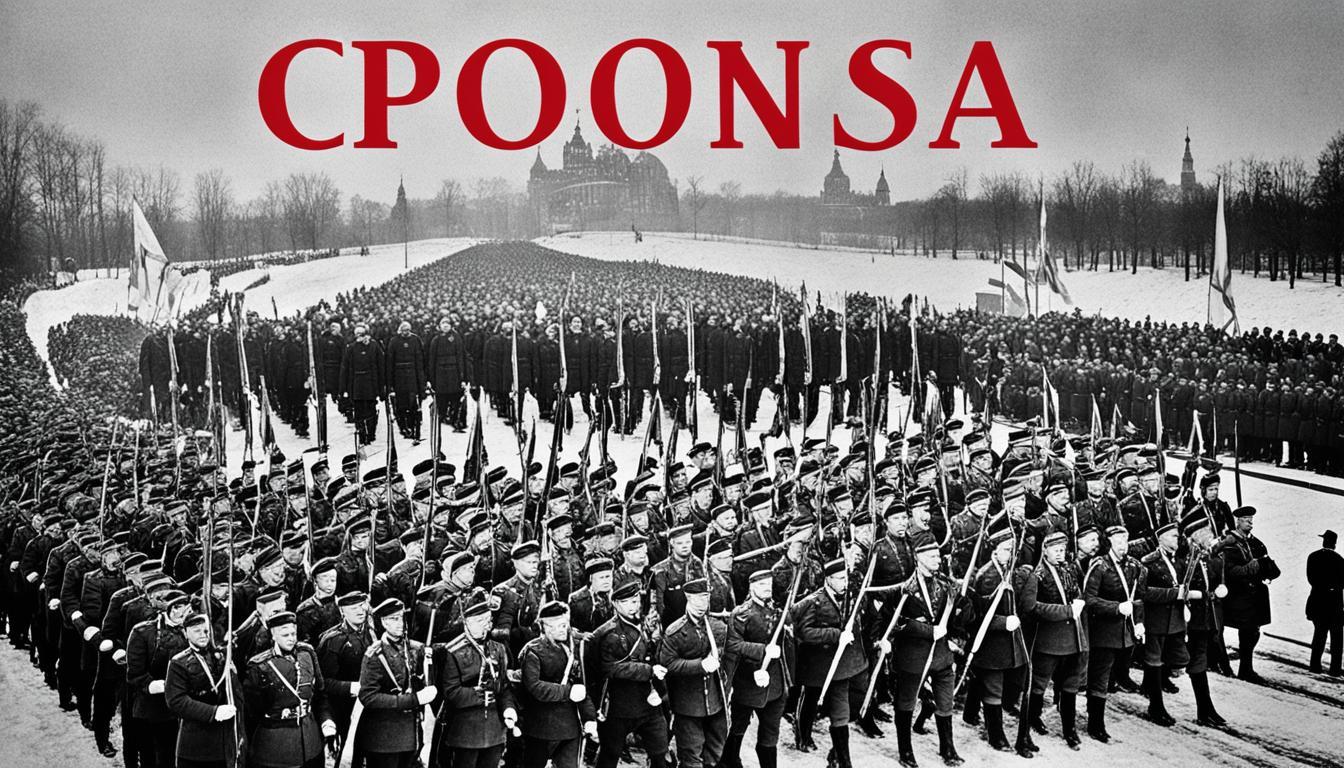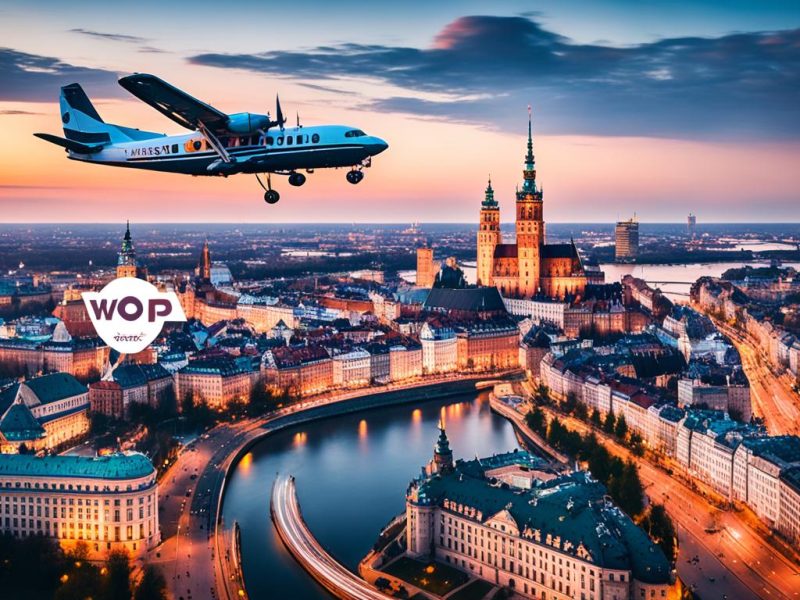Poland and Russia have a rich history that swings between alliance and conflict. This in-depth analysis explores the complex relationship in Eastern Europe’s history. It touches on the historical connections, current tensions, and political analysis needed to grasp these two nations’ relationship.
Relations between Poland and Russia have evolved through different times, reflecting changes in Eastern Europe’s political scene. These interactions highlight not just their individual stories but also wider regional and global influences. This political analysis provides deeper understanding into what drives Poland and Russia’s interactions.
Key Takeaways
- A deep dive into the historical context is essential for understanding the Poland-Russia bilateral relations.
- Eastern Europe geopolitics play a significant role in shaping the interaction between Poland and Russia.
- Poland-Russia history is marked by a complex mix of conflict and cooperation, influencing current diplomacy.
- Political analysis provides a structured perspective on the current state of relations and future potential.
- The geopolitical dynamics in Eastern Europe are key to predicting the trajectory of Poland and Russia’s interactions.
Historical Context of Poland Russia Relations
The history of Poland-Russia ties is filled with important events. These events have left a big mark on the history of Eastern Europe. From old times of grand kingdoms to today’s complex global politics, their history has seen both teamwork and disagreement.
The Origins and Medieval Interactions
Early interactions were about trade and religion. Yet, medieval conflicts often challenged these friendly bonds. The start of the Russo-Polish wars was due to wanting the same territories and led to many fights in the Middle Ages.
From the Partitions to World War Perspectives
The late 18th-century partitions of Poland changed the map. Russia and others divided Poland among themselves. In the 20th century, World Wars changed Europe again, with Poland often in the middle. The Molotov-Ribbentrop Pact of 1939 was especially harsh, leading to Poland being split by Germany and the Soviet Union.
The Cold War Era and its Aftermath
After World War II, Poland was behind the Iron Curtain. It was under Soviet influence and part of the Warsaw Pact. The Cold War’s end led to big changes for Poland and Russia. They had to navigate through the tough times of gaining sovereignty and forming new alliances.

Current Dynamics in Poland Russia Diplomacy
Recent Poland-Russia relations have been complex. They explore strategic alliances and economic dependencies. This complexity is driven by Poland’s NATO membership. It stirs political tension with Russia, amid military assertiveness on both sides. In this scenario, economic sanctions and energy dependency play crucial roles. Poland and Russia thus navigate these challenging conditions, often finding themselves in conflicting positions.
Political Stance and Military Engagements
Poland values its NATO involvement, focusing on defence and deterrence. This commitment increases political tension with Russia. Actions by Poland are closely watched by Russia. This scrutiny stems from Poland’s military moves within NATO.
Trade Agreements and Economic Ties
The political climate between Poland and Russia remains chilly. Yet, trade agreements continue. Both countries cautiously manage trade amidst sanctions. Poland is also trying to reduce its reliance on Russian energy.
Security Concerns and International Cooperation
In today’s digital world, cybersecurity is a key concern for both nations. They face challenges in protecting against cyber threats. Cooperation on international law occurs but is limited. Intelligence sharing focuses on global security, with each nation prioritising its interests.
| Aspect | Poland | Russia |
|---|---|---|
| NATO membership | Integrates with collective defence | Views expansion as a threat |
| Political tension | Exercises caution and solidarity with NATO | Leverages historical ties and influence |
| Military strategy | Focuses on deterrence and defence | Expands capabilities on Western front |
| Energy dependency | Seeks independence from Russian energy | Uses energy as a geopolitical tool |
| Economic sanctions | Enforces EU sanctions against Russia | Adapts to economic isolation |
| Trade balance | Exploring new markets | Pursuing self-reliance and pivot to Asia |
| Cybersecurity | Invests in national cyber-defence | Develops state-sponsored cyber capabilities |
| Intelligence sharing | Shares within NATO framework | Engages selectively with global players |
| International law | Adheres to international norms | Challenges the international order when beneficial |
Conclusion
The relationship between Poland and Russia is complex, filled with a mix of history and caution. Looking towards the future of Poland-Russia relations, it’s clear we need hope but also careful thought. The ties between these two countries have changed a lot over time. They were shaped by old battles, alliances, and the tangled play of political interests.
This look into their relationship shows the deep issues that still affect them. Despite their complicated past, the diplomatic forecast for Poland and Russia is full of potential. They have a history that might make you think they’ll always be at odds. But they also have a real chance to talk and find peace.
The goal of finding peace and stability in Eastern Europe is central to their future talks. This hopeful aim is what might lead to better relations. Both countries face the challenge of navigating today’s global issues together.
Everyone is watching to see if Poland and Russia can find peace and mutual respect. By sticking to international laws and working together on security, they might achieve harmony. The end result will depend on how well they play the political game. But there is hope that they will respect each other’s independence and work for the common good.
FAQ
What historical events have shaped Poland-Russia relations?
The relationship between Poland and Russia is complex. It has been influenced by many events. These include early medieval conflicts and the partitions of Poland in the late 18th century. Later, World War I and II, like the Molotov-Ribbentrop Pact, and the Cold War era’s tensions under Soviet control also played a role.
How have Poland’s NATO membership and military strategy influenced its relations with Russia?
Poland joining NATO has made its relationship with Russia tenser. This is especially true regarding regional security. Their military standoffs show ongoing concerns about Eastern Europe’s geopolitics. This situation has caused a diplomatic gap between the two countries.
In what way do energy dependency and economic sanctions affect the bilateral relations between Poland and Russia?
Energy dependency has been a key point in their relations. Poland has relied on Russian energy for a long time. Economic sanctions, like those from the EU that Poland backs against Russia, have hurt their trade and economic links.
What are the security concerns that dominate the Poland-Russia dialogue?
Security issues are central in their discussions. These include cybersecurity, the need for sharing intelligence, and different military strategies. Both nations try to handle these matters while respecting international law and their own national interests.
Can you discuss the transformation of Poland-Russia relations in the post-communist Europe?
After communism, Poland moved towards European integration by joining NATO and the EU. This has changed its ties with Russia. Moving away from Soviet influence to join the European Union has been key. Poland aims for a free and democratic society, moving away from Russia’s influence.
What challenges and opportunities exist for Poland and Russia to improve their bilateral relations?
There are challenges like geopolitical tensions and historical issues. But, there are also chances for better ties through dialogue and diplomacy. Mutual economic interests and shared goals like fighting terrorism can help improve stability in the region.
How does international law play a role in Poland-Russia relations?
International law is vital in resolving their disputes. Both Poland and Russia must follow global norms and agreements. Sticking to international law can ease tensions. However, different interpretations can lead to conflicts.



